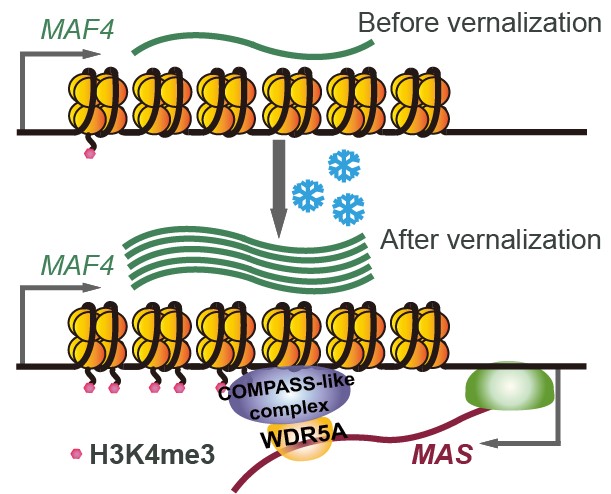Dr. Yijun Qi’s group reports global identification of long noncoding RNAs and the regulation of MAF4 by a natural antisense RNA in Arabidopsis
On November 29, 2018, Dr. Yijun Qi’s group from the Center for Life Sciences at Tsinghua University published a research article in Nature Communications, reporting global identification of long noncoding RNAs and the regulation of MAF4 by a natural antisense RNA in Arabidopsis.
In the last few years,massive transcriptome sequencing has revealed that over 75% of the human genome and over 50% of the Arabidopsis genome are transcribed, but many transcripts are not translated into proteins. Transcripts longer than 200 nucleotides that are not translated into proteins are defined as long noncoding RNAs (lncRNAs). LncRNAs have emerged as important players in the regulation of gene expression and chromatin structure. Based on their relationship with protein-coding genes, lncRNAs can be classified as natural antisense transcripts (NATs), overlapping lncRNAs (OT-lncRNAs), long intergenic non-coding RNAs (lincRNAs), and intronic non-coding RNAs (incRNAs).
In this study, in order to explore the function of lncRNAs in gene regulation and the range of such regulation in plants, Qi and colleagues employed high-depth strand-specific RNA sequencing (RNA-seq) to systematically identify lncRNAs in Arabidopsis thaliana. They annotated 6,510 lncRNAs including 4,050 NAT-lncRNAs and 2,460 lincRNAs. They found that the expression of one class of lncRNAs, natural antisense transcripts (NATs) that are transcribed in the opposite direction of protein-coding genes, often positively correlates with and is required for the expression of their cognate sense genes. They further characterized MAS, a NAT-lncRNA produced from the MADS AFFECTING FLOWERING4 (MAF4) locus. MAS is induced by cold and indispensable for the activation of MAF4 transcription and suppression of precocious flowering. MAS activates MAF4 by interacting with WDR5a, one core component of the COMPASS-like complexes, and recruiting WDR5a to MAF4 to enhance histone 3 lysine 4 trimethylation (H3K4me3). Their study greatly extends the repertoire of lncRNAs in Arabidopsis and reveals a role for NAT-lncRNAs in regulating gene expression in vernalization response and likely in other biological processes.
Ph.D students Xinyue Zhao and Bi Lian from School of Life Sciences and Dr. Jingrui Li from School of Medicine at Tsinghua University are co-first authors. Drs. Yijun Qi and Yan Li are corresponding authors of this article. The study was funded by the National Science Foundation of China and Tsinghua-Peking Joint Center for Life Sciences.
Article link: https://www.nature.com/articles/s41467-018-07500-7

A model for the transcriptional regulation of MAF4 by MAS



